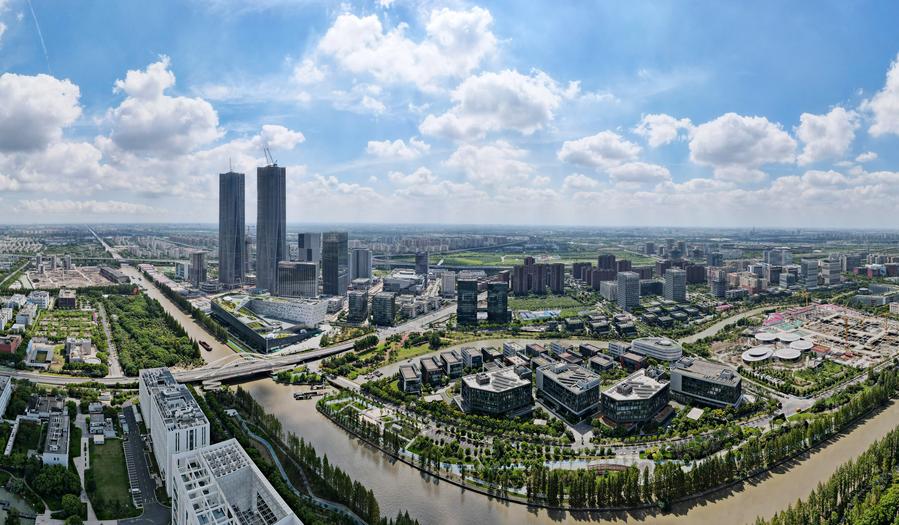This aerial photo taken on Sept. 10, 2023 shows a view of Zhangjiang area of the China (Shanghai) Pilot Free Trade Zone in east China's Shanghai. (Xinhua/Fang Zhe)
BEIJING, April 11 (Xinhua) -- China’s continued openness to the outside world boosts foreign investors' enthusiasm for investment in China.
Since the beginning of this year, China has introduced multiple policy measures to enhance the appeal and effective utilization of foreign investment.
Experts predict a steady rise in the scale of China's absorption and utilization of foreign capital in 2024.
Overseas investment flocks into Chinese market
Since the beginning of this year, foreign investors have made frequent moves in China whether in the form of direct investment or securities.
In March, for example, Hamilton Lane (Shanghai) Private Equity Fund Management Co., Ltd., a subsidiary of Hamilton Lane, was successfully registered at the Asset Management Association of China on March 18; Standard Chartered Securities officially started businesses in Beijing on March 22; the application for Qualified Foreign Institutional Investors submitted by the Superannuation Arrangements of the University of London (SAUL) was officially approved by China Securities Regulatory Commission on March 25.
Meanwhile, some foreign-funded institutions are scaling up investment and expanding business in China. In early March, Neuberger Berman, a foreign-funded public offering fund, completed its third capital increase since its entry into the Chinese market, raising its registered capital from 300 million yuan to 420 million yuan, equivalent to an increase of 40 percent.
According to the National Association of Financial Market Institutional Investors (NAFMII), a total of 13 foreign-funded financial institutions have been cleared for market evaluation, and approved to undertake bond underwriting business in China.
In terms of direct investment, the number of newly established foreign-invested enterprises in China posted a "good start" with a year-on-year increase in the first two months of this year.
In March, several foreign-funded enterprises disclosed their interest in further investment in China.
For instance, Apple announced a plan to expand its applied research laboratory in China; Novo Nordisk pledged to make an additional investment of about 4 billion yuan in Tianjin for expanding its sterile preparations production; Burger King made public its plan to open more than 200 new stores in China in 2024.
The increasing inflow of foreign capital in China is an indicator of their confidence in the Chinese market. Zhang Jianping, a deputy director of the Chinese Academy of International Trade and Economic Cooperation (CAITEC), said that it is not only the result of the introduction of the Foreign Investment Law and the improvement of supporting measures to maintain a level playing field for foreign-funded enterprises, but also a mirror of China's strong appeal to foreign investment as the world's second-largest consumer market.
Policy mix continues to play an important role
The growing enthusiasm of foreign capital in China is not separable from China's gathering place in opening up.
A basket of policies and measures to stabilize foreign investment ,including reducing the negative list for foreign investment and implementing the 24 pro-foreign investment measures,has been introduced successively.
With the introduction of the negative list of cross-border service trade at the national level and the Pilot Free Trade Zone, negative list management has been applied all across the service trade in China, a crucial move for high-level institutional opening, said Cui Fan, a professor at the University of International Business and Economics.
In March, China granted visa-free policy to ordinary passport holders from six countries, including Switzerland and Ireland, from March 14 to November 30, thus extending the policy to more European countries.
The visa-free policy is of great significance for boosting tourism and business exchanges, said Chen Bo, a researcher at Liaoning University. According to him, the unilateral visa-free policy introduced at the end of last year involved big breakthroughs in terms of ports of entry and stay time.
Since the beginning of March, China has launched a number of measures to facilitate payment convenience.
An official with the People's Bank of China said that a three-dimensional framework system has been formed, under which local governments can formulate their own work plans in light of circumstances at the time.
A number of policies and measures to stabilize foreign investment have also put in place at the local level, Zhang noted.
The "pie" is big enough
With the growing momentum in the Chinese market, "expanding investment in China" is often brought up by foreign company executives.
Working together with China, the prospect is as vast as the sky, Saudi Aramco Chief Executive Amin Nasser said at the first landmark event of "Invest in China", a government campaign to attract foreign investment and help foreign companies better understand China's opportunities.
Starting from April, the "Invest in China" campaign was successively held overseas. In Denmark, representatives of Danish enterprises expressed that they sees great potential in China, as the country has scored eye-catching achievements in new energy and other fields.
In Germany, more than 200 representatives of Chinese and German government agencies, enterprises and business associations gathered in the "Invest in China" roundtable. Matthias Mueller, general manager of MM China Link, said at the event that despite the intense competition with Chinese enterprises, the "pie" of the Chinese market is big enough with great potential.
Zhang believes that as China further advances its institutional opening-up and sustains its comparative advantages in utilizing foreign capital, the country is expected to resume the growth of foreign capital scale in 2024.
China will continue to uphold globalization, regional economic cooperation and integration, and be a firm champion of the multilateral trading system and rules including the WTO, Zhang said, adding that on that basis, China will initiate more collaboration in the global supply and value chain.(Edited by Yang Yifan with Xinhua Silk Road, yangyifan@xinhua.org)





 A single purchase
A single purchase









